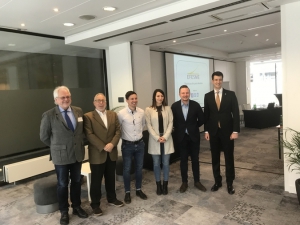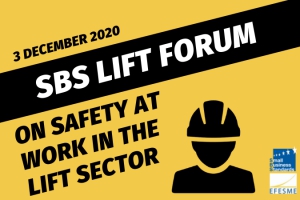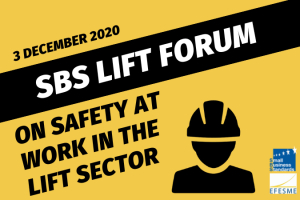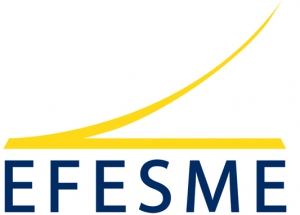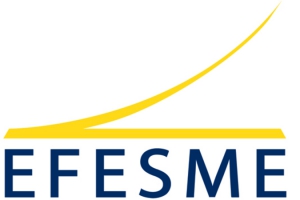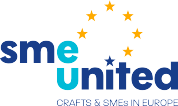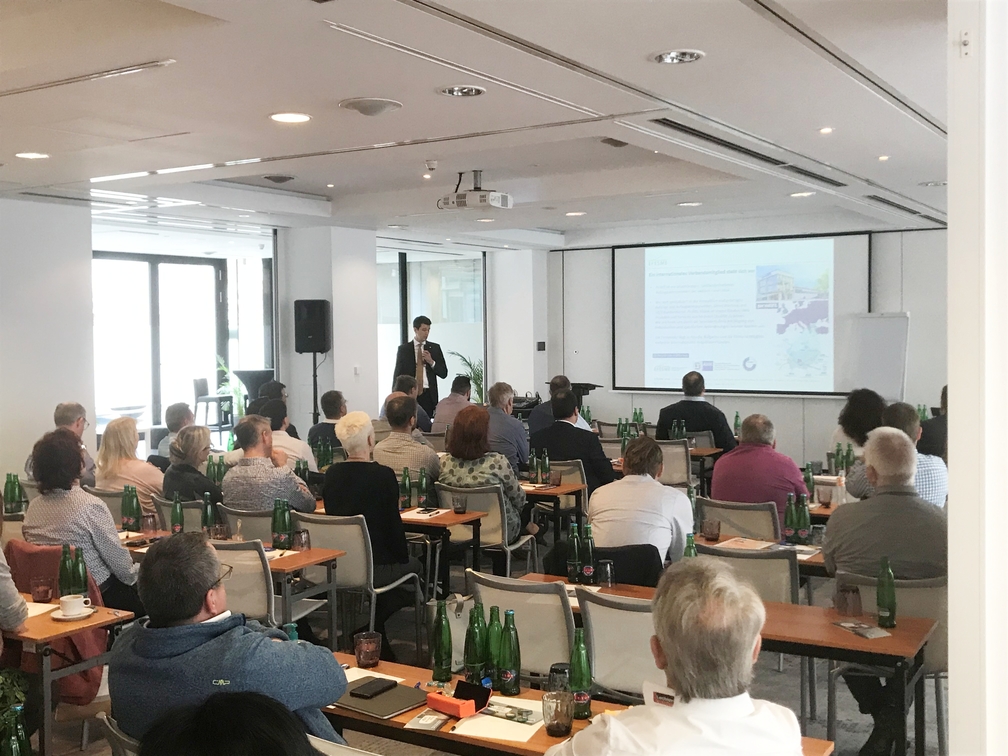
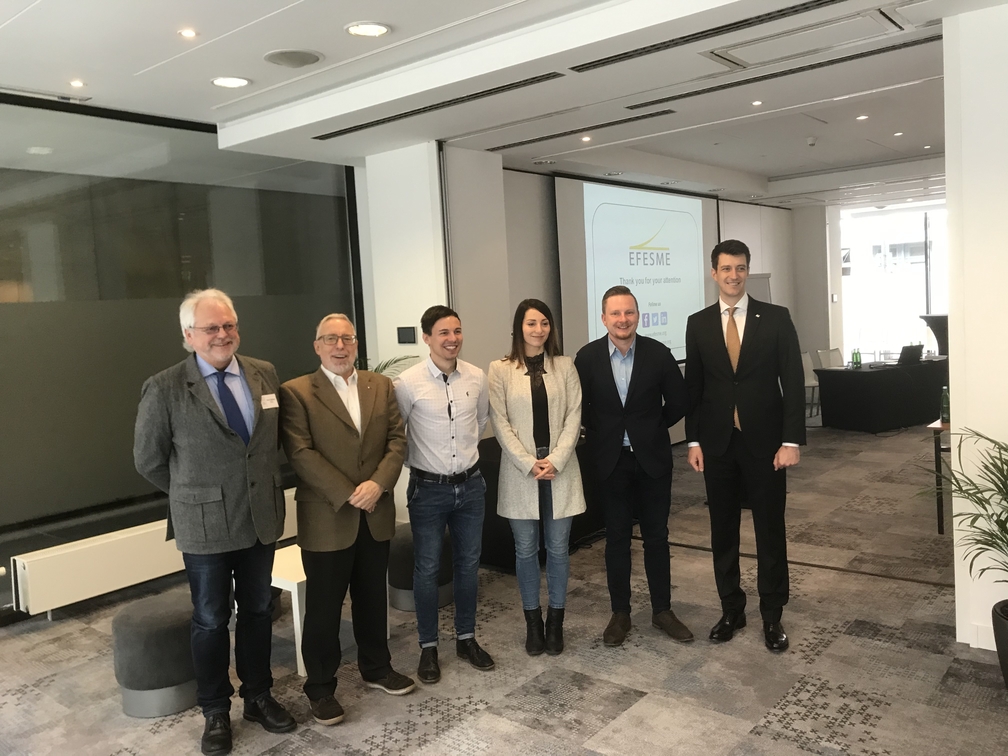
Mr. Kurt Seifert, Mr. Wolfgang Adldinger, Mr. Felix Hartung,
Mr. Mariana Krasemann, Mr. Björn Hauck, EFESME Vice-President Mr. Damyan Petrov.
EFESME and European Lift SMEs Congress
SBS Lift Forum on Safety at work ~ Highlights
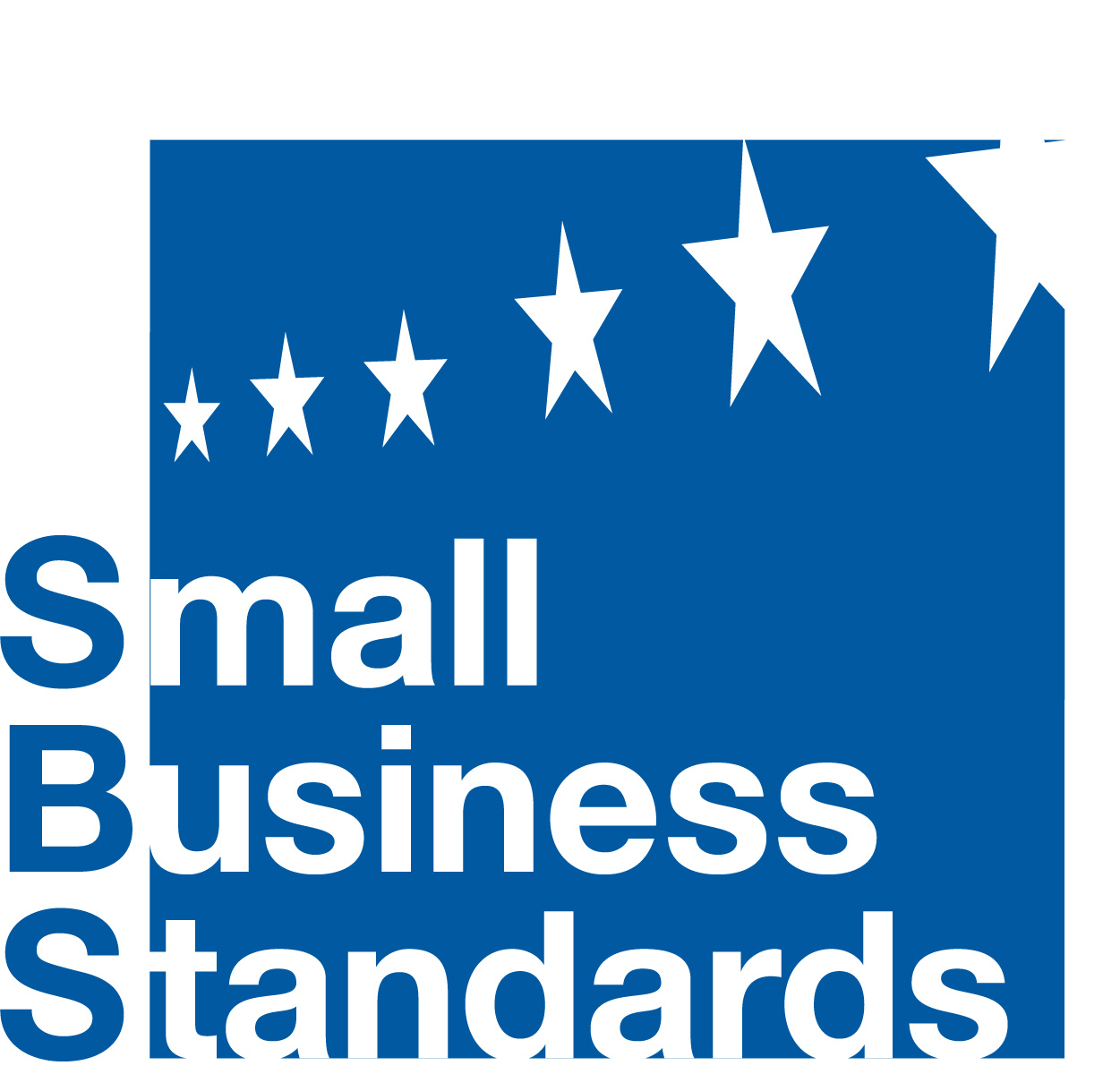
You can donwload the press release here
The last SBS 2020 event organised by EFESME was the SBS Lift Forum dedicated to safety at work, and to European and national policies in this field. The topic, always of crucial importance for all companies, became even more so during the Covid-19 emergency. EFESME and SBS therefore decided to study the topic, and to present different points of view and considerations on the subject: what are the European policies on safety at work, and how do they involve SMEs? What is the national approach on the subject, and how do lift SMEs react to it? And what is the role of standards in all this?
>>> The recording of the SBS Lift Forum is available online HERE
As per tradition, the event opened with welcome speeches, this time led by Mr. Massimo Bezzi, President of EFESME, and Ms. Gunilla Almgren, President of SBS - Small Business Standards. Both Presidents stressed that workplace safety is crucial, and that it is sometimes a particularly difficult issue for SMEs.
Nevertheless, there is no doubt that SMEs, in every sector, do their best to ensure it, and it is also clear that initiatives and projects to support them are always useful to ensure full compliance with current requirements. President Bezzi went into more detail regarding the concept of safety at work for lift SMEs, what the risks are for them, and what is the best way to continue to be safe and coimpetitive companies in the coming years. President Almgren, on the other hand, highlighted how SBS is always at the forefront of supporting SMEs in all their actions, and how standards can help to establish requirements to be met.
The event then consisted of two panels, one institutional, with the participation of the European Commission - DG EMPL and EU-OSHA; the other national, in order to have the perspective of the member states and to know in detail their initiatives. Mr. Matthias Fritz, socio-economic analyst of the unit health and safety of DG EMPL, took the floor as the first speaker to introduce the guests to the activities carried out by the European Commission regarding safety at the workplace.
Mr. Fritz's presentation focused mainly on the latest developments in EU policy in this area. Starting from a solid base of numbers and data regarding workplace accidents, Mr. Fritz explained how the situation has evolved for the better over the last twenty-five years (1993 - 2018), and what the short and long term benefits are of solving the problem of work-related illnesses Disability-Adjusted Life Years (DALYs). He spoke at lenght about the OSH related EU legislation, proving how OSH are a point of extreme interest and importance for the work of the Commission.
Where Mr. Fritz's intervention did not go specifically to the lift sector, he nevertheless spoke about the accidents that occur in the manufacturing sectors working with machinery, and made several references to the Machinery Directive and its revision, which is fundamental for the sector.
- Mr. Fritz's presentation is available here
Following Mr. Fritz, the institutional panel continued with the presentation by Mr. William Cockburn, Head of Unit at EU-OSHA, the European Agency for Safety and Health at Work.
Mr. Cockburn introduced the topic of health and safety challenges for small businesses. After giving a general overview of studies conducted by EU-OSHA in recent years, such as the three versions of ESENER, Mr. Cockburn went into detail to talk about what are the most common risks in SMEs, and then moved on to talk about the four-year programme (2014-2018) put in place to improve OSH in micro and small enterprises. The conclusions of this program are encouraging: improving OSH in micro and small enterprises is possible and there is a wide range of tools and interventions exists. Nevertheless, it is still difficult to reach the most vulnerable SMEs.
For this reason, Mr. Cockburn also stressed the importance of collaboration between the parties: this will allow a fuitiful and continuous exchange of information to support SMEs in ensuring safety in the workplace via good-practises, training, successes and other useful initiatives.
- Mr. Cockburn's presentation in available here
The institutional panel was extremely interesting; sometimes it is not particularly easy for SMEs to find the information they need to develop the right activities in favour of safety in the workplace, but the resources are there: the collaboration highlighted by Mr. Cockbrun, directly involving national, sectorial and SME associations, therefore becomes essential to achieve the greatest benefits for all.
The Forum then dwelt into the national level, to find out how the various national lift realities deal with the issue of safety in the workplace. Three EFESME members, ANACAM from Italy, FEPYMA from Spain and Vma for Germany, approached this topic from different points of view, and helped to create an all-round version of the opportunities and actions to be promoted.
Mr. Paolo Tattoli, one of the main lift experts collaborating with ANACAM, described the evolution of the legislative situation in Italy with regard to safety in the workplace, and in particular in the lift sector. His speech also allowed the public to see how the European Directives, in this case the Lift Directive, and harmonised European standards help lift SMEs in their daily work. In addition, particular attention was paid to risk assessments, used to introduce risk mitigation to make everyday work less dangerous for all operators.
- Mr. Tattoli's presentation is available here
Mr. José María Compagni Morales, coordinator for FEPYMA, instead, he addressed the subject from a second point of view, explaining how, at times, the current working culture in a state prevents the full development of increasingly precise and stringent regulations with regard to occupational safety. Mr. Compagni Morales stressed that public administrators have a duty to support prevention on the one hand, and to create the necessary conditions for safe work on the other. From this statement, he took the cue to explain the activities carried out by FEPYMA in this regard: seminars, events, training courses, everything is useful and necessary to improve the working culture towards a better safety at work.
- Mr. Compagni's presentation is available here
Finally, Mr. Udo Niggemeir, second Chairman of VmA, presented an interesting and detailed list of activities that VmA, as an association for the support of German lift SMEs, developed at national level to enable its members to develop awareness and skills regarding safety in the workplace. VmA is directly involved in various working groups, government and industry, and developed useful checklists to help its members to be sure they have met the necessary requirements in this area, for example; they have also developed specific guidance documents to work during the Covid-19 emergency, documents also used by EFESME to develop common guidelines in this regard, and how to carry out a proper risk assessment. VmA firmly believes in the importance of safety in the workplace, and its ongoing commitment is proof of this.
- Mr. Niggemeier's presentation is available here
- How to prevent a fall from a cabin roof (here in English) more details (here in German only)
The event proved to be extremely interesting for all parties involved, who had the opportunity to learn more about safety in the workplace and to learn about opportunities, projects and initiatives at both European and national level. The most important lesson to be learnt from the Forum is that safety in the workplace is certainly fundamental, but also very complicated: European, national and local initiatives are therefore necessary to ensure it, and to ensure full support for SMEs in doing so. Follow EFESME on its social media accounts (Facebook, LinkedIn, and Twitter) to stay up-to-date with our activities and events, and feel free to contact us at This email address is being protected from spambots. You need JavaScript enabled to view it. for more information about our work and activities and to be added to our newsletter and news mailing list.

SBS Lift Forum ~ Safety at work in the lift sector

The European Commission - DG EMPL and EU-OSHA, the European Agency for Safety and Health at Work, will be among our guests during the first panle, dedicated to the EU institutions. This will be the perfect occasion to illustrate to our audience what the European institutions are doing about occupational safety and health on the work place, and about what are the specific EU policies and projects in this regards, especially for SMEs.
During the second panel, on the other hand, some of the EFESME members will speak about the most important standardisation provisions on this topic and about the many activities they have that have been carried out in recent years to support lift SMEs and ensure safety in the workplace.
Check the programme for more details! We hope to see you there, with many interesting questions for our speakers. Should you have any question, the EFESME Secretariat remains at your disposal at This email address is being protected from spambots. You need JavaScript enabled to view it. should you need any further information.

SBS Lift Seminar - Dialogues on CEN/TC10: the current revision of lift standards and its Impact on SMEs
EFESME organises its first Public General Assembly
In order to be as close as possible to its members, their associates and SMEs in the sector at this difficult time, EFESME has decided to organise its first public General Assembly. The event will take place on Monday 15 June, from 11 am to 1 pm, and will be accessible at the following link.
The event will be attended by EFESME experts and members, so that we can present and discuss together the activities carried out so far in the technical and regulatory field, at the national level and among the members. The activities done so far at the European and national level to address the COVID-19 will be another interesting topic of discussion, which will see the participation of several EFESME members recalling their experiences and actions. There will also be an intervention by SBS - Small Business Standards to meet their new director, Ms Maitane Olabarria Uzquiano.
We hope to see you numerous and with many questions to ask our experts and members during the Q&A session.
EFESME Public General Assembly ~ Highlights
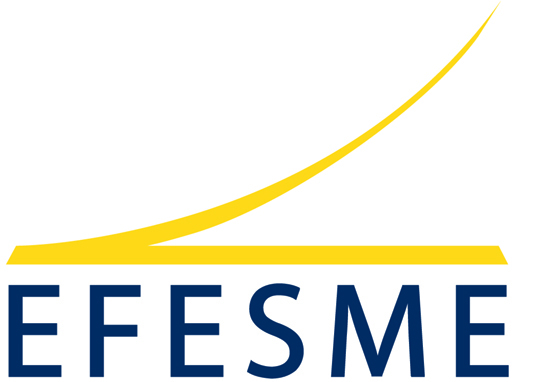
Given the extraordinary and exceptional conditions we are experiencing, EFESME organized for the first time a public General Assembly to overcome the consequent impossibility of organizing events and meeting in person with its experts, its members, their associates, and guests.
The event allowed EFESME to present to its guests the activities carried out in recent months, ranging from the collaboration with SBS - Small Business Standards to the many projects developed with its members, without forgetting the rich technical activity carried out by EFESME experts in the numerous working groups followed to ensure a 360° support to SMEs.
The General Assembly opened with a short speech by President Bezzi, who stressed the extraordinary conditions in which the world finds itself at the moment, and the need, therefore, to organize such an event remotely. Nevertheless, the President also wanted to underline how opportunities can arise from this global crisis, and how EFESME wants to exploit them to give SMEs as many tools as possible to overcome the crisis and be more and more competitive.
Activities with SBS
The panel on the activities carried out with SBS was attended by Ms Maitane Olabarria Uzquiano, the new Director of SBS since January 2020. Ms Olabarria Uzquiano used her speech to introduce herself and SBS, stressing that cooperation and collaboration between the two organisations is essential to ensure that standards and standardisation activities are as SME-friendly as possible. The Assembly then went on to discuss the technical activities carried out in standardisation, which were discussed and presented by the various EFESME experts involved in ISO, ETSI, CEN-CENELEC and Notified Bodies.
- Mr. Tiziano Caresani spoke about his activities within CEN TC10 WG13 and within the Machinery Directive Working Group of the European Commission (PPT);
- Mr. Marco Cogliati presented the work done so far within the ETSI Smart M2M group, where several documents on smart lifts are under development (PPT);
- Mr. Luciano Faletto, the Secretary General of EFESME, went into details about the numerous activities within the ISO TC178, the CEN TF HaS and the Notified Bodies for Lifts (PPT);
- Finally, Mr. Lars Odlen, active in the ISO TC178 ADH New Technologies, presented the most recent updates regarding remote communications and digital opportunities in the lift sector (PPT).
COVID-19 crisis
The conversation then moved on to the COVID-19 crisis, how the European lift industry reacted to the pandemic and lockdown, and what EFESME, as a European Federation, did to support its members and the SMEs it represents.
EFESME-ELA guidelines
Having recognised the specific needs of the sector during the crisis, especially as regards how to behave outside a company, EFESME has developed sector guidelines to give clear and precise indications on how to behave when it is necessary to intervene at an installation for maintenance, repair and rescue of trapped people
- The guidelines are available for download here (in English)
The document was by the EFESME experts during several internal meeting and on the basis of input and comments submitted by the various EFESME members. Moreover, the elaboration of the final version also saw the participation of ELA - European Lift Association, EFESME's counterpart for large companies and multinationals in the sector, and counts on the support of SBS - Small Business Standards and SMEunited. This showed how how crucial it is for SMEs to be able to rely both on information that is precise, simple and shared from the various players in the lift sector, and on the support of the European organisations created to support their needs and their work, aspects that were underlined during the panel, which also saw the participation of Mr Luca Pezzini, Secretary General of ELA.
EFESME Members' activities on COVID-19
Of course, also the individual members of EFESME have also taken action at national level to inform and support their members during the crisis, and have done so in very different and all extremely effective ways. For example:
- ANACAM, Italy, gave an overview of the actions carried out so far in Italy, both by the government and the Association, presented its national guidelines that have converged into European ones, and introduced those present to the regional remote meetings organised to meet SMEs from all over Italy.
- FEPYMA, Spain, organized a weekly, then a bi-weekly series of meetings via GoToMeeting, in order to discuss the crisis with its SMEs and keep them updated on a regular basis. They also developed sectoral infographics, useful to EFESME for the development of the guidelines.
- VmA, Germany, developed and distributed national guidelines and infographics, which were also sent to EFESME and contributed to the drafting of the above European guidelines.
During the General Assembly, it was very important for the Federation as well as for its members and guests to see how different actors in the sector have taken action, together, to ensure that SMEs and the sector as a whole can have the tools to react to the crisis and return to work safely in as normal a situation as possible. The Federation is particularly pleased with the activities carried out with and by its members in this field, as evidence of the continuous and deep commitment to provide SMEs with all the tools they need to thrive.
EFESME Activities
In addition to the activities closely related to COVID-19, EFESME and its members also presented all the other activities that have been carried out in recent months, outside the purely technical and standardisation activities followed by the experts with the support of SBS. These activities were mainly focused on digitalisation, of great importance for the lift sector, and on the activities carried out at national level, where EFESME has been, is, and will be present to always support SMEs and the whole sector.
Digital Working Group
Among the many activities of the Federation, particular emphasis was placed on the creation of the EFESME Digital Working Group. Strongly supported by the President and members, the WG was created after the Board of Directors' meeting of October 17, 2019 when, following a series of events dedicated to digitalisation and cybersecurity, the Federation decided to give a more stable structure to its studies on these important issues. To date, the work of the WG has been mainly dedicated to coordinate the work of experts in ETSI and ISO, to gather inputs among members to develop the position of the Federation, and to discuss with other stakeholders the most important aspects of digitalisation in the lift industry.
Activities AT the national level
EFESME members also had the opportunity to present the activities organised and carried out at national level in recent months, as well as those they are planning in the near future. Unfortunately the COVID-19 emergency disrupted the plans of many associations, and cancelled or postponed many commitments in which EFESME intended to participate. Nevertheless, the Federation and its members have already taken steps to organize and attend the next events, taking due account of health precautions.
- VmA, Germany - As remembered by Mr Kanzler, President of VmA, in March 2020, EFESME, represented by its Vice-President, Mr Damyan Petrov, attended the 35th VmA General Assembly. During the prestigious meeting, several topics dear and important to the German lift sector were discussed, and EFESME the activities were presented to the German partners, in order to bring the European and national lift industry closer and closer together.
- FEPYMA, Spain - Although the European and National Congress scheduled for October 2020 has been cancelled due to concerns about COVID-19, FEPYMA has relaunched the idea of organizing the European Congress remotely, so that a European-style event can still be organized and involve experts, partners and SMEs. The Federation and its members have already started to work to organize the Congress, so that they can take advantage of every opportunity to be close to SMEs.
- ANACAM, Italy - Mr Luca Incoronato, Director of ANACAM, took the opportunity to introduce the event that the Italian association is organising for December 2020, in Milan. The event, which was initially scheduled for June 2020, has been postponed because of COVID-19: the will to organize it in Milan, according to Incoronato, is a strong signal of confidence in the city. The event will focus on digital and the future of the sector. Further information is available on the ANACAM website.
The event has turned out to be a winning bet for the Federation, and organizing online meetings, in parallel with those usually organized in person in Brussels or at the invitation of their members, will become in the coming months another useful tool to spread the news, the latest news and activities of the Federation.
By acting in this way, EFESME hopes to be ever closer to its members and their associates, providing SMEs with an additional means to be always in touch with the European reality and the decisions that are taken in Brussels.
